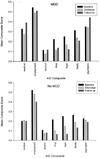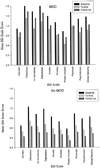Depression among methamphetamine users: association with outcomes from the Methamphetamine Treatment Project at 3-year follow-up
- PMID: 19363377
- PMCID: PMC2749575
- DOI: 10.1097/NMD.0b013e31819db6fe
Depression among methamphetamine users: association with outcomes from the Methamphetamine Treatment Project at 3-year follow-up
Abstract
Although depression is highly comorbid with substance use disorders, little is known about the clinical course and outcomes of methamphetamine (MA) users with depressive symptoms and syndromes. In this study of MA-dependent individuals entering psychosocial treatment, we predicted that (1) depressive symptoms would decline during treatment, an effect that would vary as a function of MA use and (2) depression diagnoses post-treatment would be associated with poorer outcomes. Participants (N = 526) were assessed for depression, substance use, and psychosocial outcomes at baseline, treatment discharge, and 3-year follow-up. Depressive symptoms declined significantly during treatment, an effect that was greatest among those who abstained from MA. Major depression at follow-up was associated with poorer MA use outcomes and impairment across multiple domains of functioning. The findings highlight the relationship of depressive symptoms and diagnoses to treatment outcomes, and suggest a need for further studies of depression in populations using MA.
Figures



References
-
- Beck AT, Steer RA, Garbin MG. Psychometric properties of the Beck depression inventory: Twenty-five years of evaluation. Clin Psychol Rev. 1988;8:77–100.
-
- Beck AT, Ward CH, Mendelson M, Mock J, Erbaugh J. An inventory for measuring depression. Arch Gen Psychiatry. 1961;4:561–571. - PubMed
-
- Brown RA, Monti PM, Myers MG, Martin RA, Rivinus T, Dubreuil ME, Rohsenow DJ. Depression among cocaine abusers in treatment: Relation to cocaine and alcohol use and treatment outcome. Am J Psychiatry. 1998;155:220–225. - PubMed
-
- Cannon DS, Rubin A, Keefe CK, Black JL, Leeka JK, Phillips LA. Affective correlates of alcohol and cocaine use. Addict Behav. 1992;17:517–524. - PubMed
-
- Carroll KM, Nich C, Rounsaville BJ. Differential symptom reduction in depressed cocaine abusers treated with psychotherapy and pharmacotherapy. J Nerv Ment Dis. 1995;183:251–259. - PubMed
Publication types
MeSH terms
Substances
Grants and funding
LinkOut - more resources
Full Text Sources
Medical

